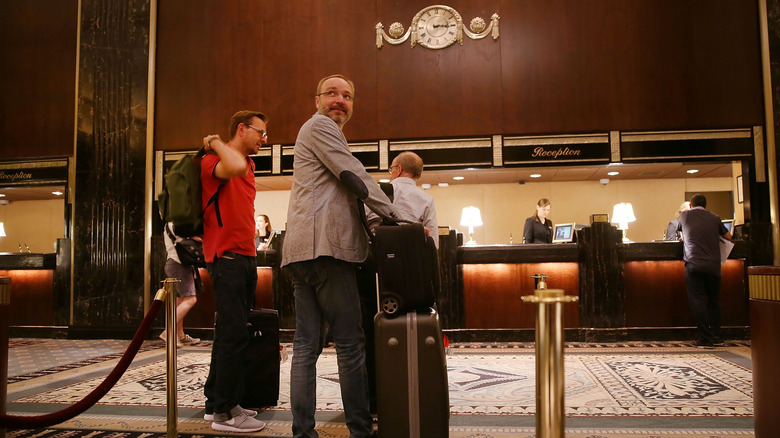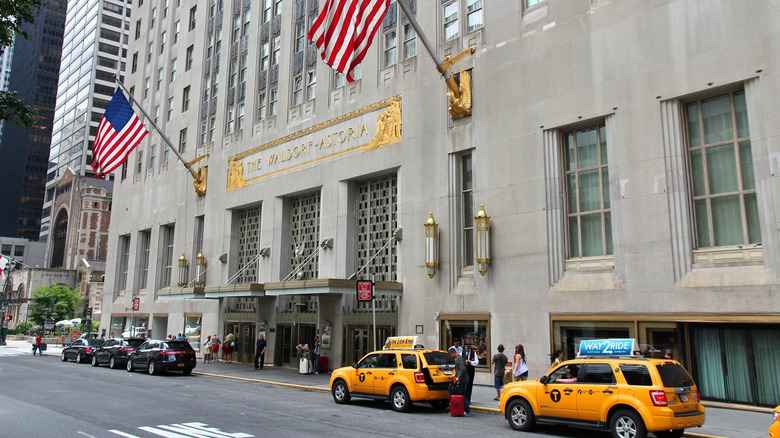The Luxurious US Hotel Chain That's Owned By China
It comes as a surprise to some when they realize that companies from the People's Republic of China (PRC) own some notable brands in the United States. One is Smithfield Foods, America's biggest supplier of bacon, ham, and sausages. Another is Waldorf Astoria. In September 2014, Hilton Worldwide agreed to sell Manhattan's Waldorf Astoria to Beijing-based Anbang Insurance Group for $1.95 billion, a record price for a single U.S. hotel at the time, according to Forbes. It had 1,413 spacious guest rooms, that works out to about $1.38 million per room, and it was $220 million more than the Cosmopolitan of Las Vegas, which Blackstone bought for $1.73 billion just five months earlier.
The grand Art Deco icon in New York City has welcomed every U.S. president since Herbert Hoover and even served briefly as the United Nations' first headquarters. After the sale, Hilton signed a 100-year contract to keep managing the hotel. The deal gave China (and Anbang) more confidence; other Chinese buyers, including state-backed insurers and sovereign wealth funds, followed Anbang's lead and went after top U.S. properties. In under two years, Anbang agreed to pay about $6.5 billion for Strategic Hotels & Resorts' 16 luxury venues, including the JW Marriott Essex House in New York, and San Diego's Hotel del Coronado.
Anbang's fraud and embezzlement case
Anbang's fast push into global markets drew government attention. In February 2018, China's banking and insurance regulator stepped in and took control of the company for 18 months. Officials said the takeover was needed because of illegal management activities that may seriously endanger the solvency of the company. A later probe found about $12 billion in hidden debts from off-balance-sheet deals.
In 2017, Chinese authorities detained Anbang's founder, billionaire Wu Xiaohui. He was detained in June 2017, tried in Shanghai and sentenced on May 10, 2018 to 18 years for fund-raising fraud and embezzlement; the court ordered confiscation of 10.5 billion yuan (about $1.6 billion) in assets and China's regulator said Anbang accumulated about 65 billion yuan (about $10 billion) in unapproved liabilities.
These legal challenges slowed down Anbang's takeover of the Waldorf Astoria. The hotel closed on March 1, 2017, for a makeover — turning parts into condos and updating the rest — but repeated setbacks have pushed the reopening to 2025 under new management. Also, security worries came up in June 2015, just a year after Anbang struck its deal. The U.S. State Department ended its decades-long lease on the presidential suite and moved diplomats to other Midtown hotels over fears that ties to the Chinese government could put secure communications at risk.
The state of Waldorf Astoria in 2025
Recall that after Anbang bought the Waldorf Astoria for $1.95 billion in 2014, Hilton stayed on to run the hotel under a 100-year management deal. With Hilton still at the helm, Anbang announced a massive makeover. The hotel closed on March 1, 2017, for what was meant to be a four-year, $1 billion renovation.
Architects Skidmore, Owings & Merrill designed a plan to keep signature Art Deco spaces — the Park Avenue lobby, Peacock Alley, and the Grand Ballroom — while carving the 1,413 rooms into 375 refreshed hotel suites and 375 ultra-luxury condos. Part of the package includes a lap pool, spa, residents-only lounge, and private restaurant. Rising construction costs have since pushed the budget toward $2 billion. Progress slowed when China's regulators seized Anbang in 2018 and shifted its U.S. assets, including the Waldorf Astoria, to Chinese state-owned Dajia Insurance.
Funding froze and completion dates slipped. The project finally regained momentum in late 2023, and by February 2025 the first condo owners began moving in. Agents say about half the units are already under contract. Hilton is now taking reservations for stays beginning in September 2025, when the Waldorf is expected to reopen as a hybrid condo-hotel reviving its Art Deco grandeur while adapting to a new phase of mixed-use luxury, an era where an Airbnb might be seen as a better deal than booking an hotel room.


